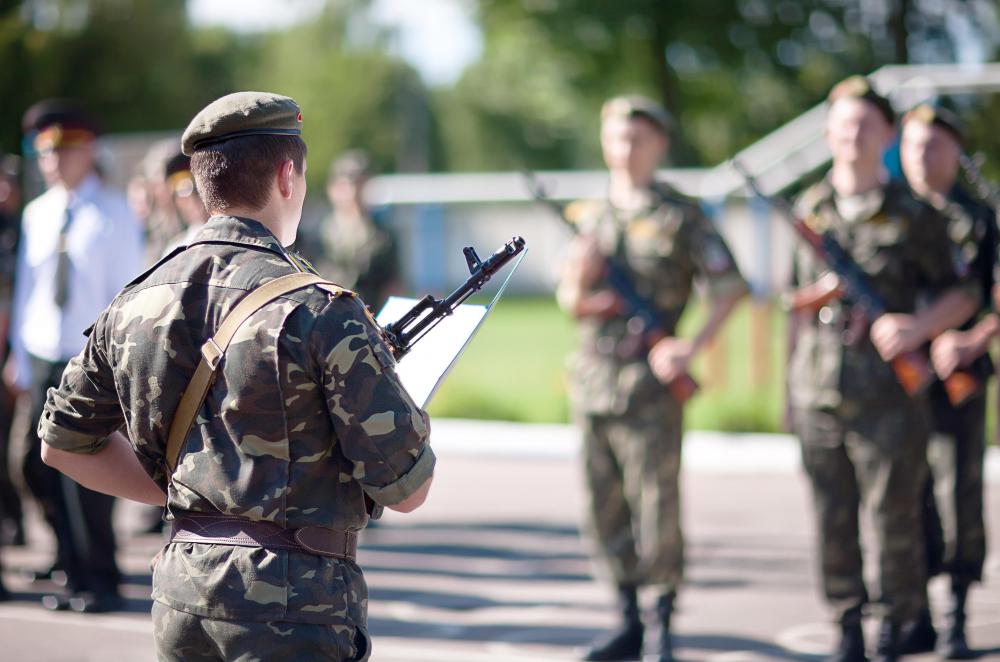At WiseGEEK, we're committed to delivering accurate, trustworthy information. Our expert-authored content is rigorously fact-checked and sourced from credible authorities. Discover how we uphold the highest standards in providing you with reliable knowledge.
What does a Court-Martial Lawyer do?
A court-martial lawyer represents either the government in a military court, presenting its case much like a civilian prosecutor, or represents the defendant in such a case. A court-martial lawyer has generally received legal training in an accredited law school in the US and has been admitted to the bar of the highest court of any state of federal court. Upon being commissioned in the US military and taking special military legal training, these officers are designated judge advocates.
Members of the US military are governed by a set of regulations called the Uniform Code of Military Justice (UCMJ), all violations of which are prosecuted by the military as criminal cases in legal proceedings called courts-martial. A court-martial is an ad-hoc body convened by the commanding officer, called the convening authority (CA), for the purpose of adjudicating a single case. There are three types of court-martial. A summary court-martial is convened for minor offenses; one officer is assigned a hear the case, without a prosecutor or defense counsel, and punishment options are very limited. Special and General Courts-Martial are convened for more serious offenses, and are structured similarly to civilian courts &emdash; that is, they're presided over by military judges, and the prosecution and defense are each handled by lawyers.

The court-martial lawyer responsible for prosecuting a case is called the trial counsel, who is a judge advocate assigned to the case by the appropriate military justice command. The defendant is represented by defense counsel, who is usually a judge advocate appointed at no cost to the defendant, but the defendant is permitted to hire civilian counsel. The cost of civilian counsel is borne by the defendant, but the judge advocate assigned to the defendant stays with the case and assists the civilian defense counsel.

The CA will select a panel of military personnel to serve as a jury, although they may be challenged by counsel and dismissed by the judge if warranted. A defendant may also elect not to have a panel, choosing instead to have the verdict decided by the judge alone.
The trial counsel bears responsibility for representing the government in the case, just like the prosecutor in a civilian criminal case. Two duties of the trial counsel not performed by a civilian prosecutor are preparing the record of the case, under the judge's supervision, and administering the oath to witnesses. Once appointed, the trial counsel is also responsible for conducting any necessary investigations to develop additional evidence.

The duties of a military defense lawyer are similar to those of a defense lawyer in a civilian criminal court. All are related to the zealous defense of the accused; however, there is a feature of a military trial that's usually missing from a civilian trial. Although a court-martial is convened by the commanding officer, and its jury also selected by the same person, these individuals are expected to render justice impartially without concern for “command influence." That is, even if they know the commander's opinion of the case and desired outcome, which is permissible, that knowledge may not influence their interpretation of the law or the evidence presented. Likewise, panel deliberations must also be conducted free of command influence. A court-martial lawyer acting as defense attorney must be alert to the possibility of command influence and if it appears, challenge it.

Thus, while the duties of a court-martial lawyer are in many respects similar to those of corresponding counsel in criminal cases in civilian courts, the duties of both trial counsel and defense counsel include special responsibilities unique to the military justice system.
AS FEATURED ON:
AS FEATURED ON:














Discuss this Article
Post your comments